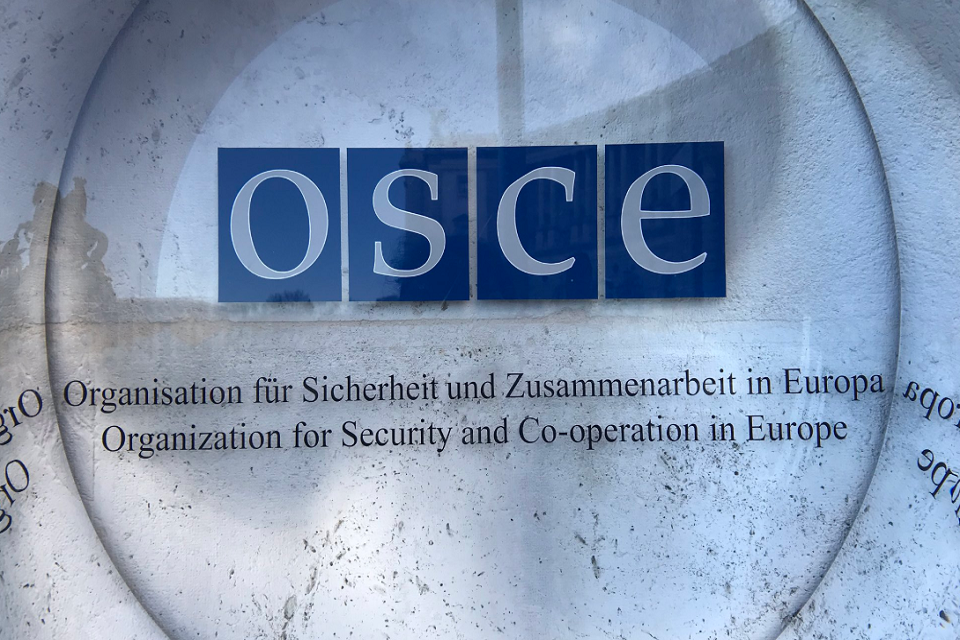Head of OSCE Mission to Moldova: UK response, 28 April 2022
Deputy Ambassador Deirdre Brown thanks Dr Neukirch, Head of OSCE's Mission to Moldova, for the team's work in Moldova.

Thank you Mr Chair and welcome, Dr. Neukirch to the Council. I join other speakers in thanking you and your team in Moldova for your work during this turbulent time. Russia’s unprovoked and unjustified invasion of Ukraine has had an impact on all of us, but particularly on Ukraine’s neighbours. We applaud all those in Moldova who have supported over 400,000 Ukrainian refugees who have crossed the border since the commencement of Russian aggression in Ukraine. Thank you also for your assistance and that of your team to Special Monitoring Mission (SMM) colleagues evacuating from Ukraine. In addition, we welcome the Mission’s excellent response to the invasion, including significantly increasing monitoring visits to the security zone.
Thank you also for your update on the four incidents in Transnistria on 25th, 26th and 27th of April. We share your deep concern and look forward to a full, transparent explanation. We condemn any deliberate destabilisation of the security situation in the security zone and we call on sides use their influence to help maintain peace and stability. It is critical to prevent escalation.
We welcome the visits last month to the Republic of Moldova by the Polish Chair in Office Foreign Minister Rau and OSCE Secretary General Helga Schmid and the upcoming visit by the OSCE Polish Chair’s Special Envoy Dmochowski and Special Representative Mayr-Harting.
Although much of our attention is focused on the impact of the war in Ukraine, it is important not forget the needs of the Moldovan people and the government’s reform agenda. In April during the Moldova Support Platform Conference, the UK along with Romania committed to co-lead on the anti-corruption theme, while the UK pledged £12 million in Good Governance Funding over the next three years to support Moldova. We are pleased to see that the OSCE Co-ordinator for Economic and Environmental Activities, Mr Igli Hasani, will work with us on that initiative.
We welcome continued discussions at working group level, including through the online format, and between the Chief Negotiators. Such ongoing co-operation builds trust and can lead to positive progress in other areas, including implementation of outstanding Berlin-plus package measures.
Dr Neukirch, we applaud your efforts to implement the Women, Peace and Security Agenda through initiating a capacity building project for female members of the Joint Expert Working Groups and with UN Women on the establishment of an information Women Advisory Board- featuring women’s voices and perspectives from across Moldova. The UK is delighted that our Embassy in Chisinau played a part in the initial analysis which contributed to development of this important project.
Whilst recognising that the current situation makes progress on the political “third basket” impossible, the United Kingdom continues to support the Permanent Conference on Political Issues (“5+2”) as the mechanism most conducive to a comprehensive, peaceful and sustainable settlement of the Transnistrian conflict based on the sovereignty and territorial integrity of the Republic of Moldova, within its internationally recognised borders, and with a special status for Transnistria.
The UK has regularly expressed its concern at the ongoing presence of the Operational Group of Russian Forces (OGRF) on the territory of the Republic of Moldova. Following attacks on Ukrainian sovereignty, we repeat and emphasise that concern today. We also take this opportunity to call on the Russian Federation to urgently formulate a proposal for resumption of the process of removal and destruction of ammunition from the Cobasna site. The UK affirms that this process must include the OSCE, in accordance with the 1999 Istanbul Declaration and subsequent extension of the mandate of the Mission to Moldova.
We are concerned at the legislative initiative taken by the de facto Transnistrian authorities which would make it a criminal offence for a resident of the Transnistrian region to petition Moldovan or international courts on alleged human rights abuses suffered in Transnistria. This measure goes against all human rights norms and should not be enacted.
Finally, I’d like to thank you, Dr. Neukirch for the professionalism and skill you have shown in leading the Mission during these extremely turbulent and times. We wish you all the very best in your future endeavours.
Thank you Mr. Chair.